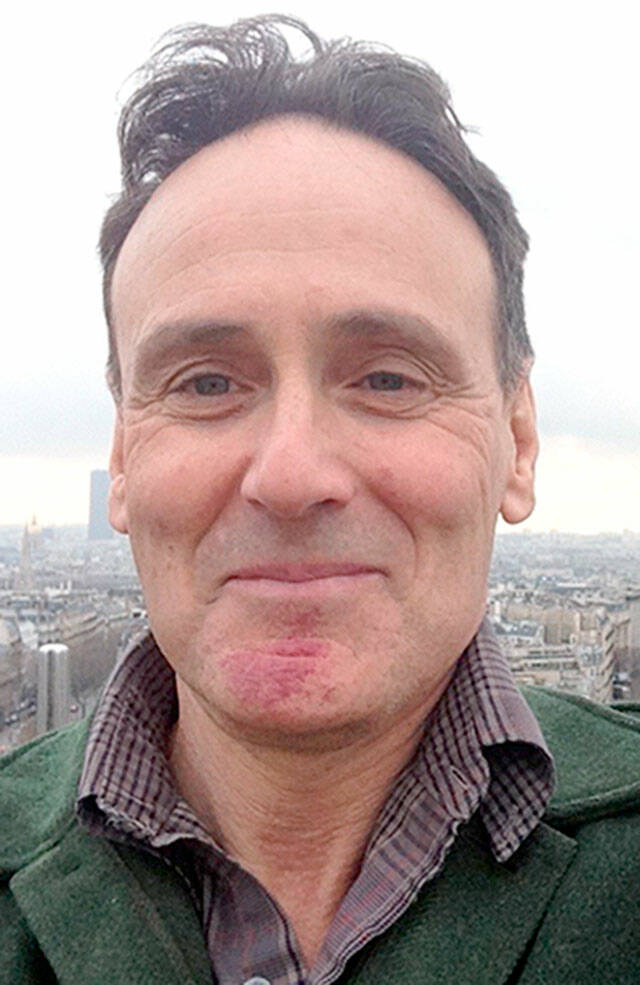By Paula Hunt
For Peninsula Daily News
PORT ANGELES — David Guterson admits the furious output that distinguished his early writing career when he published five novels in less than 20 years has slowed, but that does not mean that he is working less.
Writing short stories and poetry, spending time with his family and grandchildren, and hiking have kept him busy.
A new novel, “The Final Case” (272 pp. Alfred A. Knopf. $27), released in January is evidence that he has not stepped away from the literary form that established his reputation with the magical best-selling “Snow Falling on Cedars” published in 1994.
Guterson will discuss writing and the creative process as Writer in Residence at Peninsula College today and Thursday in a series of events that are free and open to the public.
In addition to a book signing and speaking with students at Port Angeles High School, Guterson will deliver a Studium Generale lecture, “Why Write?”, on Thursday at the Peninsula College Little Theater to be followed by a screening of the film version of “Snow Falling on Cedars” (1999).
Guterson was a high school English teacher on Bainbridge Island, married, and with four children when he began working on “Snow Falling on Cedars” in fall 1983. He was busy, but he made sure to carve out time for his writing. That meant squeezing in 45 minutes before heading off to work, dedicating time on weekends and during school breaks.
He didn’t have a daily page or word quota; he just made sure to write.
“It’s all a matter of priorities,” Guterson said. “When you have the free time, you do it. I would get done what I got done.”
Guterson was freelancing for magazines like Harper’s when his first published work, a collection of short stories, “The Country Ahead of Us, the Country Behind,” was published in 1989.
Five years later, the phenomenal success of “Snow Falling on Cedars,” which has sold more than 4 million copies, won the PEN/Faulkner Award for Fiction, and was made into a movie, propelled Guterson into a publicity machine, which he was not quite comfortable with.
“Lots of promotion and publicity for a long time,” he said dryly.
On the other hand, he was able to quit teaching and devote all of his time to writing.
Even after his workload began tapering off after the publication of “Ed King” in 2011, Guterson was still productive: three short story collections, the non-fiction “Descent: A Memoir of Madness” (2013), and “Turn Around Time: A Walking Poem for the Pacific Northwest” (2019), which was nominated for a 2020 Washington Book Award. And, this year, back to novels with “The Final Case.”
Guterson said he was looking forward to talking to students at the high school and Peninsula College, citing the importance of three mentors who were instrumental in his development as a writer and fostering belief in his own talent.
Cleta Hughes, his English teacher at Roosevelt High School in Seattle, was a particularly strong early influence, Guterson said. She taught T.H. White’s “The Once and Future King” by sifting it through a Jungian lens, leading students through the identification of themes and archetypes and challenging them intellectually.
Her familiarity with the material and facility for explanation in complex topics were critical lessons for a future novelist who has delved into thorny issues such as race, memory and violence. That she also made sure to get to really know all of her students made a distinct impression on Guterson.
“She said, ‘I see you. I see YOU,’ and she would look right at you,” Guterson said.
At the University of Washington, Guterson gained two more mentors, creative writing professors Lois Hudson and Charles Johnson.
What struck Guterson about all of his mentors was that each had a passion for teaching, took it seriously and made every moment of class time meaningful.
Guterson will apply the lesson of purposefulness to his Thursday Studium Generale lecture, “Why Write?”, when he will explore the many and various reasons people write: to entertain, to make money, to say something socially meaningful.
Guterson’s aim in writing speaks to the creative thinking that informs his work and its literary intentions.
“Connecting with other people,” he said. “We are all different, but I want to find the common humanity in all of us. We are a mystery to each other, but we try to find a connection and a commonality.”
Guterson said he hoped to get in a few hikes during his stay in Port Angeles if the weather cooperates and he has the time.
But his priority as a writer in residence, he said, was different.
“To listen, and learn.”
________
Paula Hunt is a freelance writer and photographer living in Port Angeles.

